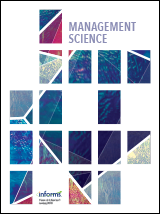Academic articles
Practitioner articles
Working papers
Books
Book chapters
Case studies
Other publications
Subject(s)
Strategy and general management; Technology, R&D management
Keyword(s)
Innovation strategy
Organizations can make better choices about which R&D projects gain funding by managing bias and involving more people.
Volume
63
Subject(s)
Product and operations management
The structure of the efficiency-driven industry model contributed to supply chain failures under the pandemic. Industry leaders must now pursue alternative strategies to create resilience, despite the risks.
ISSN (Print)
0015-6914
Subject(s)
Entrepreneurship; Technology, R&D management
ISSN (Print)
0017-8012
Subject(s)
Human resources management/organizational behavior
This book is a collection of challenging cases in executive coaching from the annals of the ESMT-Berlin Coaching Colloquia - yearly events for experienced professionals committed to advancement of the coaching profession. In the period of 2009-2018, hundreds of difficult cases were discussed by coaches from all over the world in an intensive but safe environment of the ESMT Berlin Campus. This volume presents a few of those cases to the interested public and offers a unique opportunity to explore the work of coaches from within and to reflect upon ways professionals approach ambiguous moments in their practice. The cases do not serve the purpose to endorse or critique a particular coaching choice, but rather give the reader an opportunity to think about their own ways of handling professional challenges in coaching engagements. The book can be an exciting self-development tool or instructional material for courses in coaching training or supervision.
Volume
2nd ed.,
ISBN
979-8769553929
Subject(s)
Human resources management/organizational behavior
Keyword(s)
multi analyst studies, open science, data, analytical variability, analyst analytics
Any large dataset can be analyzed in a number of ways, and it is possible that the use of different analysis strategies will lead to different results and conclusions. One way to assess whether the results obtained depend on the analysis strategy chosen is to employ multiple analysts and leave each of them free to follow their own approach. Here, we present consensus-based guidance for conducting and reporting such multi-analyst studies, and we discuss how broader adoption of the multi-analyst approach has the potential to strengthen the robustness of results and conclusions obtained from analyses of datasets in basic and applied research.
Volume
10
Journal Pages
e72185
Subject(s)
Strategy and general management
Keyword(s)
Price discrimination, personalized pricing, mobile apps, online games, freemium
JEL Code(s)
D40, L11
Pages
93
Subject(s)
Technology, R&D management
Keyword(s)
R&D incentives, tax incentives, innovation, technology
This article provides a structured overview on the most important features of the new German legislation awarding tax breaks for R&D active companies.
Volume
2021
ISSN (Print)
1868-2979
Subject(s)
Information technology and systems; Product and operations management; Strategy and general management; Technology, R&D management
Keyword(s)
digital identity, technology
The article deals with the potential that lies in the creation of a digital identity. More concretely, the article explores to what extent the customer experience can be improved by a digital/electronic identity system that allows customers to just use one single mobile app to pull data from various providers.
Subject(s)
Human resources management/organizational behavior
Keyword(s)
Leadership, remote work, emotional intelligence
Eloïse has a problem. The company’s board has decided that her team will be moved to a new location – one that is in a shabby building, located far off the beaten track, and (adding insult to injury) with a horrible staff canteen. The kicker: The board tasked Eloïse with informing her team, who will be returning from their home offices to this new pandemic workplace reality. In her latest article for Forbes, Nora Grasselli, program director of ESMT Executive Education, tackles what these tough situations demand of Eloïse and other executives who are having to manage the economic fallout of the pandemic for themselves and their teams. Often, they are left to manage it alone, under conditions of extreme stress and cut loose from network support. What, asks Grasselli, can Eloïse do to handle leadership solitude and its consequences?
ISSN (Print)
0015-6914
Subject(s)
Health and environment; Information technology and systems
Keyword(s)
Public health, epidemic control, information design, strategic behavior
This paper explores how governments may efficiently inform the public about an epidemic to induce compliance with their confinement measures. Using an information design framework, we find the government has an incentive to either downplay or exaggerate the severity of the epidemic if it heavily prioritizes the economy over population health or vice versa. Importantly, we find that the level of economic inequality in the population has an effect on these distortions. The more unequal the disease's economic impact on the population is, the less the government exaggerates and the more it downplays the severity of the epidemic. When the government weighs the economy and population health sufficiently equally, however, the government should always be fully transparent about the severity of the epidemic.
© 2021, INFORMS
Volume
67
Journal Pages
6350–6357
ISSN (Online)
1526-5501
ISSN (Print)
0025–1909

